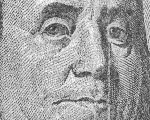 A week ago, I cashed a check for a little over $160, at my local Bank of America branch in downtown San Diego. The bank teller handed me a hundred, a fifty, and the rest in common bills and change. I thanked her, wished her a good day, and walked out of the bank.
A week ago, I cashed a check for a little over $160, at my local Bank of America branch in downtown San Diego. The bank teller handed me a hundred, a fifty, and the rest in common bills and change. I thanked her, wished her a good day, and walked out of the bank. I found out today (while paying for some furniture) that the $100 bill was fake. It was a convincing reproduction (the counterfeit detection pen didn't work on it), but holding it up to the light next to the $50 bill revealed a noticeably different security strip. The one in the $100 bill was more opaque and harder to read.
Being a man of principle (and in sudden need of $100), I drove to a Bank of America just down the street and handed the counterfeit bill to the teller (Suzette), asking her to confirm it was fake. She showed it to her manager (Damaris), who pronounced it fake before running it through the sorting/detection machine to confirm the fact. I knew I couldn't prove that Bank of America gave me the counterfeit, but I still explained how I'd received it and politely requested compensation. Of course, Damaris denied my request, offering me a look of sympathy that looked more like wary defensiveness. I asked Suzette to help me withdraw another $100 from my account. She offered me a $100 bill. I half-laughed, and requested twenties.
Shortly afterward, I returned to the branch that had given me the counterfeit bill, and repeated the same dance with the manager there. I hoped that a sense of personal responsibility and connection might get me somewhere. I was treated to an encore performance of the same "bank policy" apology and counterfeit sympathy. No surprise, I was not expecting any other result. Hoping, but not expecting.
My defect analysis follows...
In A Nutshell
The Defect: Bank immunity from consequences for passing counterfeit bills.
The Consequence: Customers pay for banks' counterfeit bills.
The Fix: Create a paper trail, such as tracking serial numbers for large denominations.
Deliberate?: Meh...
In Depth
"It is bank policy not to replace counterfeit money once it is removed from the bank." This is what I was told (twice), and it's very clever. It is perfectly logical, and implies the customer is at fault (for leaving the bank with counterfeit money). Bank of America would like us to believe we are to blame for not authenticating the money they hand us before we walk off the premises.
The defect here is not related to the authentication of money--authenticating money is a side issue that has no good solution. No matter how good you are, there will always be a better counterfeit. One of the managers I spoke with helpfully told me that they don't even bother with counterfeit detection pens any more. You could have the bank check it for you, but what if their machines are faulty, out of date, or just unreliable? Even if they detect a counterfeit, they will simply replace it with a valid bill. Their only consequence is that they have lost that money, which actually gives them motivation to avoid checking the bills. They don't face any repercussions for having given you counterfeit currency. Your only alternative is to train yourself to detect counterfeit currency. The number of people who will do this is certainly not enough to make banks worry about the consequences of handing out counterfeit bills.
The defect in this system is that the bank has no practical motivation to authenticate the money it gives you. Of course, any bank will rigorously test money you give to it, because it will probably lose that money if it is counterfeit (unless it opts to recirculate the money without checking it). However, the bank faces no such consequences for handing you a counterfeit $100 bill. Though it is a crime to knowingly pass counterfeit currency, how could anyone prove them of committing it? Banks have the perfect cover for passing counterfeit money...they pass so much of it, how could they authenticate it all?
Remediation
In my opinion, tracking the currency used in bank transactions seems like the only way to motivate banks to avoid recirculating counterfeit currency. Tracking could be accomplished by requiring banks to log the serial numbers of large bills used in any cash transaction. They could provide receipts containing these serial numbers to customers, or allow customers to track this information online.
It is worth noting that tracking currency presents possible privacy issues, if that tracking information were abused. Perhaps an opt-in approach would be necessary.
Deliberate? (aka. the tin-foil hat section)
Keeping a paper trail for currency would cost banks time and money. Since they face no tangible consequences for passing counterfeit currency, they have no reason to spend money trying to avoid doing so. The only times I've seen a bank employee use an authentication machine is when they are taking my money. When they are giving me money, they always give it to me straight from a drawer. Are banks deliberately passing counterfeit currency? Probably not, and who could prove it if they were. Are banks deliberately avoiding spending money on practical measures to avoid passing it? Certainly. To them, the cost simply outweighs the benefit. I don't blame them for not doing it, but it seems like bottom-line mentality to me.
Here are just a few reports of banks passing counterfeit money:
- Wachovia Bank: http://www.local6.com/news/16960809/detail.html
- Bank of America: http://www.wealthjunkies.com/money/bank-of-america-counterfeit-money/
- Bank of America: http://www.ripoffreport.com/reports/0/376/RipOff0376282.htm
- Wells Fargo: http://blogs.mercurynews.com/consumeractionline/2006/12/07/counterfeit_mon/
- http://www.knoxnews.com/news/2008/Oct/15/bank-responds-counterfeit-lawsuit/
